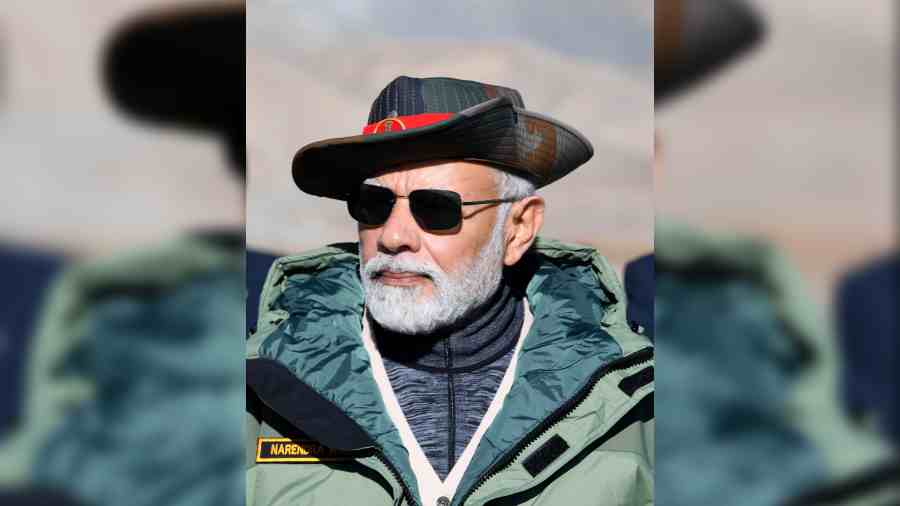Prime Minister Narendra Modi suggested on Saturday that government work, including recruitments, had speeded up on his watch. But Sonu Kumar from Ayodhya and Arup Roy from Bajali in Assam may find this difficult to swallow.
Sonu applied to the Railway Recruitment Board (RRB) for a Group D post under the Non-Technical Popular Category (NTPC) in early 2019, just before the last general election. The recruitment exam was held just two months ago, and he is waiting for the results.
Arup had applied in 2018 for the post of a central police force constable and has taken the Staff Selection Commission’s (SSC) general duty exam.
He is clueless about his fate as the SSC has appointed 55,000 personnel without clarifying when the remaining 5,000 advertised posts would be filled.
Some other candidates who didn’t want to be named too said the process of recruitment was marked by delay, leaving them stressed.
In June, the Modi administration had decided to appoint 10 lakh people to government jobs within the following 18 months. On Saturday, Modi participated virtually in a “Rozgar Mela” to publicise the first tranche of 75,000 appointments across government departments and autonomous institutions.
While the government says the recruitment process for these 75,000 began only in June – implying it was completed with remarkable speed -- sources suggested the process for many of the appointments had begun earlier.
For instance, the process to appoint the new faculty members at central universities who were handed over their letters on Saturday had started eight to ten months ago, they said.
The Congress has claimed that many of the appointment letters were held back for months so that all 75,000 could be handed over at one go to build hype and grab eyeballs.
In his Rozgar Mela speech, the Prime Minister referred to “one lakh” recruitments.
“The completion of the process of recruitment of one lakh personnel in a few months shows the change in government work culture over the last seven-eight years. We saw the situation eight to ten years ago when even small government work used to take months. Files used to gather dust,” Modi said.
“A lot of hard work has helped bring in the change. During earlier governments’ time, applicants (for any post) had to suffer from the date of application. They had to queue in front of the houses of leaders to attest the copies of certificates. We have given relief to youths by starting self-attestation. We have abolished interviews for Group C and Group D posts.”
Sonu’s own experience has been different. In February 2019, the RRB advertised 1.03 lakh NTPC Group D posts. Over one crore candidates including Sonu applied.
“The exam was supposed to be held in June 2019, but it was eventually conducted two months ago. We are waiting for the results,” he said.
“The successful candidates will have to undergo physical and medical tests and document verification before being issued appointment letters. The process may take till March-April next year, which will be more than four years from the date of advertisement of the posts.’
Sonu, however, accepted that the provision for self-attestation and the abolition of interviews for Group C and Group D recruitment had made the process smoother. However, he said, the eventual speed of recruitment depended on whether an election was round the corner.
“In 2018, the RRB advertised NTPC Group C and Group D posts and completed the process in 16-17 months (recruiting close to 60,000 people). When there is a general election coming up, the pace of recruitment is faster. It slows down after the election is over,” Sonu said.
Arup said the SSC had advertised 60,000 general duty posts of constables and riflemen in July 2018, and nearly 60 lakh candidates had applied. However, the SSC selected only 55,000 candidates in January 2021. The rest of the candidates have been protesting in Delhi and other cities, demanding that the remaining 5,000 posts be filled.
“The SSC has not clarified anything about these 5,000 posts. It should declare the results for these posts too,” Arup said.
Separate emails were sent on Saturday afternoon to Railway Board chairman V.K. Tripathi and SSC chairman S. Kishore seeking their reactions to the charges of delayed recruitment. Their responses are awaited.
The Centre has for several years been facing criticism over the unemployment rate which, at 6.1 per cent in 2017-18, was the worst in four decades. Since then, according to the Periodic Labour Force Survey, the rate has been 5.8 per cent in 2018-19, 4.8 per cent in 2019-20 and 4.2 per cent in 2020-21.
While the Congress called the Rozgar Mela a pre-poll “tamasha”, the government’s appetite for turning appointments into photo-ops appeared insatiable.
In Bhubaneswar, Union education minister Dharmendra Pradhan handed over appointment letters to 239 people recruited into the various departments at IIT Bhubaneswar.
An education ministry official said the boards of governors of the IITs appointed or promoted faculty members, not the ministry or the minister.











